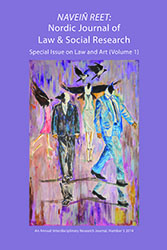Capturing Obscenity: The Trials and Tribulations of Saadat Hasan Manto
DOI:
https://doi.org/10.7146/nnjlsr.v0i5.111077Abstract
There is something extraordinarily evocative about great fiction or literary narratives by great writers of fiction on the theme of coercive authority. The celebrated South Asian Urdu essayist and short story writer Saadat Hasan Manto (1912-1955) belongs to a long tradition of highly gifted authors who had the occasion of personally encountering and confronting the cumbersome machinations and the at times mindless and oppressive logic of authority. Like other eminent writers of his ilk, his reflections on his experiences – Manto underwent several criminal trials for allegedly obscene writing – have left posterity with much more than the irate chronicles of someone confounded by an exhausting personal ordeal. We are bequeathed instead with a wealth of deep, astute, and compelling observations of a keen-eyed, sensitive, and articulate man – observations that continue to hold great relevance and wide appeal so many decades later. This article endeavours to capture Manto’s unique critique of imposed legal frameworks for ‘acceptable’ creative expression, as well as his memorable picturization of the spectacle of the legal trial in colonial and post-colonial contexts.
Downloads
Published
How to Cite
Issue
Section
License
Counting from number 12 (2022), articles published in NNJLSR are licensed under Attribution 4.0 International (CC BY 4.0). Readers are allowed to copy and redistribute the articles in any medium or format, to adapt and revise the articles, and use the articles for commercial purposes, provided that the readers give appropriate credits.
No Creative Commons licenses are applied on articles in number 1 (2009)-11 (2021). All rights reserved by the authors. Readers are allowed to download, read, and link to the articles published in volume 1 (2009)-11 (2021), but they may not republish or redistribute these articles without permission of the authors.

